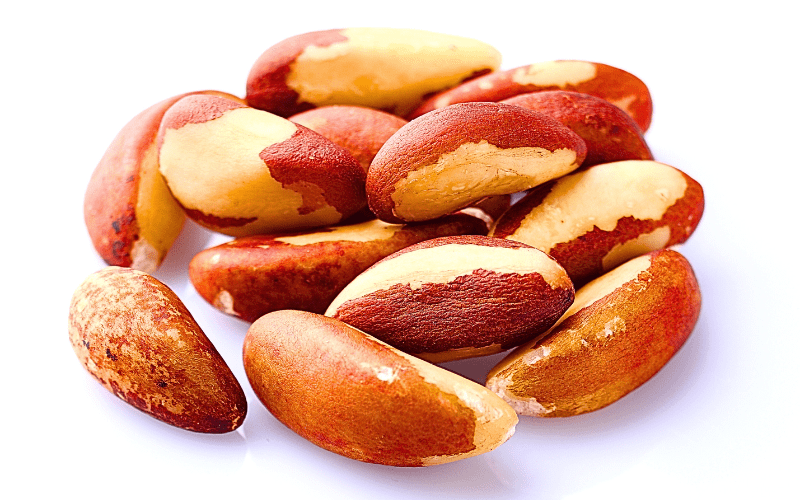Brazil Nut Advantages: Selenium for Thyroid Support
Prepare to embark on a nutty adventure where the humble Brazil nut emerges as an unsung hero for thyroid health. Within these brief snippets, you’ll catch a glimpse of nature’s pharmacy, as Brazil nuts waltz in with minerals in tow. Selenium stars in this tale, with a supporting cast of fiber, protein, and vitamins holding fort.
You’ll dance through the do’s and don’ts, sidestep any selenium pitfalls, and find creative ways to beckon these crunchy delights to your dinner plate. So, buckle up, for we’re about to crack open nutritional truths like a Brazil nut’s hard shell.
What’s the Big Deal with Selenium?

Brazil nuts are a powerhouse of selenium, a trace mineral essential for your thyroid. Picture this: just two brazil nuts a day can meet 100% of your daily selenium requirement. This little nut doesn’t mess around—it delivers 55 micrograms of selenium per nut, making it the richest dietary source you can snack on.
But Why Selenium?
Selenium’s claim to fame is its pivotal role in thyroid hormone production. Dr. Elizabeth Pearce, of the Boston University School of Medicine, says, “The thyroid has the highest selenium content per gram of tissue among all our organs.” It’s like this: without selenium, there’s no active thyroid hormone, and without that, your body’s metabolism could stumble like a clumsy ballerina.
How Does This Nut Outpace Others?
Whereas other foods play catch-up, brazil nuts sprint ahead in the selenium race. Almonds and peanuts step aside; even a single ounce of brazil nuts dwarfs them with nearly ten times the selenium. It’s almost unfair, like a tortoise and hare scenario, but where the hare is seriously on its game.
Can You Have Too Much of a Good Thing?
As with any mirthful marathon, pacing yourself with brazil nuts is key. Nutritionists warn that going overboard can lead to selenium toxicity, a real party spoiler if there ever was one. Moderation, as they say, is not just for monks and dieticians—it keeps the selenium celebration safe and enjoyable.
How Does Selenium Empower the Thyroid?
It’s really about selenoproteins—fancy proteins that use selenium as a building block to help your thyroid function like a well-oiled machine. They’re like your thyroid’s personal mechanics, constantly tuning up the engine to keep it humming smoothly on the metabolic highway.
Is It Just Thyroid Health?
Oh no, selenium is no one-trick pony. It supports the immune system like a trusty sidekick and crosses swords with oxidative stress like a noble knight. Cardiologist Dr. Suzanne Steinbaum notes, “Selenium is crucial not just for thyroid health but also for our overall well-being.”
What’s This About Cancer and Selenium?
Studies have been winking at selenium’s potential to flirt with cancer prevention. Researcher Dr. Mark Moyad mentions, “There’s a suggestion that higher selenium levels might be associated with a lower risk of prostate and breast cancer.” It’s like brazil nuts might be carrying a secret anticancer charm.
The Elephant in the Room: Soil Quality
Here’s a kicker—not all brazil nuts are equal in selenium. It’s a bit of a soil story. Dr. Gerlis Fugmann, agricultural researcher, explains, “Selenium content in Brazil nuts largely depends on the selenium levels in soil where the trees grow.” It’s as if the nuts are soil samplers, dishing out whatever selenium the earth served them.
Can’t You Just Pop a Supplement?
Sure, you could take a selenium supplement, but registered dietitian Karen Ansel says, “Food sources of selenium are preferable to supplements due to better absorption.” Besides, who wouldn’t prefer munching on tasty nuts over swallowing a pill?
What About Thyroid Disorders?
Thyroid disorders, like hypothyroidism, often call for a close-up on selenium intake. Endocrinologist Dr. John Duncan advises, “Patients should work closely with their healthcare provider to manage selenium levels, as it can be particularly beneficial for those with thyroid disease.” It’s a matter of fine-tuning that internal thyroid compass.
Are Brazil Nuts Sustainably Harvested?
Good news for the eco-conscious: the majority of Brazil nut harvesting supports the rainforest—it’s non-invasive and promotes conservation. It seems the Brazil nut tree understands the delicate dance between giving and taking from nature.
Do Other Nutrients Tag Along with Selenium?
Let’s not forget about the other nutrients tagging along. These nuts also bring fiber, protein, magnesium, and vitamin E to the party. Nutritionist Dr. Mary B. Engler adds, “The fiber in Brazil nuts can help lower cholesterol levels and promote digestive health.” It’s like selenium brought friends to the thyroid support group.
What’s the Verdict on Brazil Nuts for Thyroid Support?
The bottom line: If your thyroid were shopping for support, brazil nuts would be in the cart, next to the kale and blueberries. Just remember, like any good thing—music festivals, sunbathing, binge-watching your favorite show—too much can lead to regret. So, grab a handful, not a bucketful.
How to Enjoy Them?
Brazil nuts aren’t just for solo snacking. Chop them up and toss them into a stir-fry or sprinkle over a salad. Think of them as culinary wanderers, happy to join whatever dish you’re cooking up. Their creamy texture and nutty flavor can add a delightful twist even to a ho-hum dish.
Future Perspectives: Nutty for Selenium?
As research continues to untangle the web of selenium’s health benefits, one thing remains clear: Brazil nuts are a simple, tasty shortcut to thyroid health. It’s like Mother Nature crafted her own little pill, wrapped in a crunchy shell, just to keep your thyroid ticking. Cheers to that, I say. Cheers indeed.
